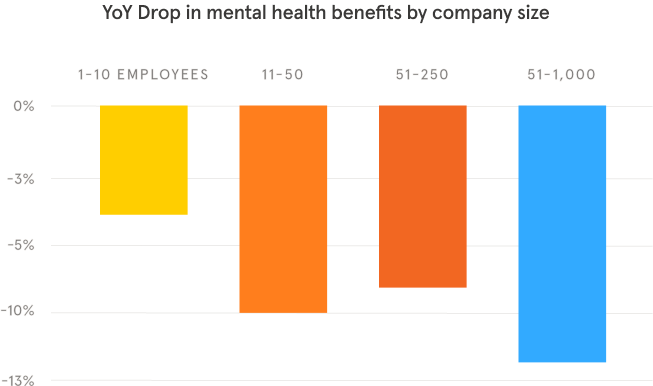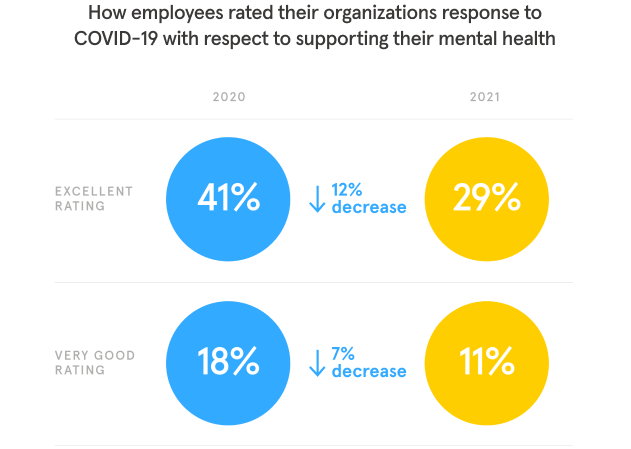Staff are more stressed and burnt out by work today than they were at the start of the pandemic, yet companies have cut back on mental health support, according to Headspace For Work.
The study reveals that employers are providing fewer mental health benefits and resources this year. In 2020, 54% of employees said their organisations were providing mental health programming, services, or benefits. This year, that dropped to 47% – a 13% decline; even though more than half of all employees believe employer-provided mental health solutions are essential benefits. Surprisingly, the larger the organisation, the larger the decline in health benefits (see chart below).
Employees also report work stress, burnout and work-life balance as greater concerns this year, according to the survey of more than 5,000 working adults in the US, UK, France, Germany and Australia across 21 industries.
In fact, employers are doing a worse job supporting mental health during the pandemic than they were a year ago, revealed the research carried out by Headspace’s enterprise business. Staff feel that mental health and well-being are a less of a priority in their organisations this year, with budgets being cut compared to 2020.

BURNOUT ON THE RISE
Staff burnout – which the World Health Organization says is caused by chronic stress – is up 10% in the US in 2021 (8% higher globally); compared to 2020. However, on a positive note, workers say their stress is easing; with 54% of people reported being stressed or extremely stressed this year, compared to 61% in 2020. Although some people are reporting lower levels of stress, many are still feeling the effects of the past year’s sustained crises. While overall stress fell slightly this year, women (58%) remain more stressed than men (46%).
Financial worries (47%) and work-life balance (38%) remain top sources of stress, followed by work-related stress at 36%. Fewer people cited health or politics as sources of stress, which fell 18% and 41%, respectively.
SUPPORTING EMPLOYEE MENTAL HEALTH
“We see things steadily improving, but we still have a long road to help people find a state of normal; and for employers to provide the needed resources to support employee mental health,” stressed Cindy Bladow, Chief Business Officer at Headspace. “People are still trying to adjust to a situation that is changing constantly; and the stress is taking a toll on everyone. Employer-provided mental health solutions have never been more in demand.”
Almost two-thirds of employees are using mental health solutions offered by employers, up slightly from last year. Around 59% reported use in May 2020, compared with 64% in 2021 – an 8.5% increase, according to the survey. At the same time, fewer employees think their employers are doing an excellent or very good job of responding to Covid-19; dropping from 41% to 29%. And 18% fewer employees report having employer-provided mental health solutions at their disposal in 2021 compared with 2020.

HEALTH BENEFITS A TOP PERK
Along with flexibility and work-from-home options, people now rank mental health benefits among their top three perks when considering a new job. “Talent leaders who want to attract and retain great workers need to address the rise of employee burnout and answer the call for employer-provided mental health solutions,” commented Dr Clare Purvis, Senior Director of Behavioral Science at Headspace. “Employees are telling us they want solutions that will help them minimise their stress; find more focus; and bring their best selves to work.”
Other key findings in the Mental Health Trends Report: Rising Work Stress and Burnout, include:
- Employees’ use of mental health solutions is up 8.5%, increasing from 59% in 2020 to 64% in 2021.
- Three in four people say mental health solutions should be backed by science; unchanged from last year’s survey.
- Retirement savings plans ranked second among job seekers on last year’s survey while mental health benefits ranked fourth. Retirement savings plans fell to fourth this year; while mental health benefits moved into third behind flexible hours and work-from-home options.
Click here to access the full survey. Another recent study has revealed that 92% of employees worldwide are suffering from work-related burnout. Click here to read more.







































